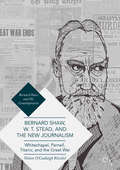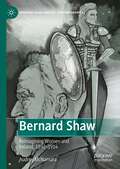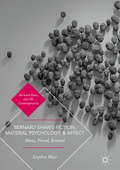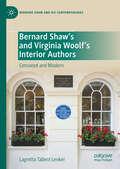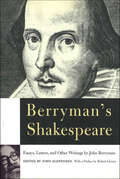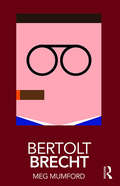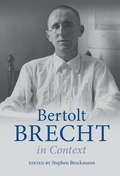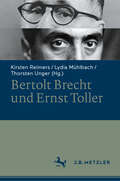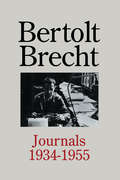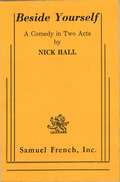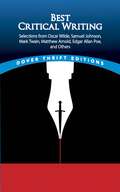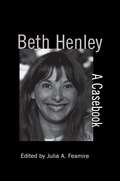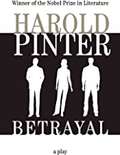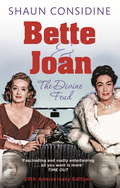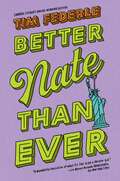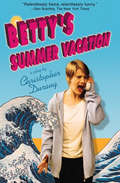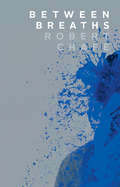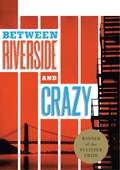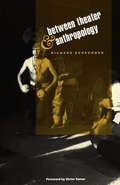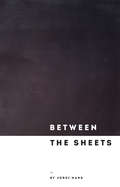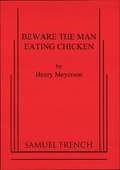- Table View
- List View
Bernard Shaw, W. T. Stead, and the New Journalism
by Nelson O'Ceallaigh RitschelThis book explores Bernard Shaw’s journalism from the mid-1880s through the Great War—a period in which Shaw contributed some of the most powerful and socially relevant journalism the western world has experienced. In approaching Shaw’s journalism, the promoter and abuser of the New Journalism, W. T. Stead, is contrasted to Shaw, as Shaw countered the sensational news copy Stead and his disciples generated. To understand Shaw’s brand of New Journalism, his responses to the popular press’ portrayals of high profile historical crises are examined, while other examples prompting Shaw’s journalism over the period are cited for depth: the 1888 Whitechapel murders, the 1890-91 O’Shea divorce scandal that fell Charles Stewart Parnell, peace crusades within militarism, the catastrophic Titanic sinking, and the Great War. Through Shaw’s journalism that undermined the popular press’ shock efforts that prevented rational thought, Shaw endeavored to promote clear thinking through the immediacy of his critical journalism. Arguably, Shaw saved the free press.
Bernard Shaw: A Reassessment
by Colin WilsonThe author devotes much thought to Shaw's formative years, 20-30, and how his novels built up the Shaw persona, and how his success changed him.
Bernard Shaw: Reimagining Women and Ireland, 1892–1914 (Bernard Shaw and His Contemporaries)
by Audrey McNamaraShaw emerged as a playwright in the politically charged environment of 1892, for both female suffrage and Irish independence. His plays quickly advocated for societal changes with regard to women’s roles, while expanding this advocacy into considerations of Ireland. Shaw’s engagement with marriage and union as a personal contract with nationhood have never before been considered as a methodology with which to view his work. This book demonstrates that Shaw was deeply engaged with and committed to the Irish question and to social and gender issues.
Bernard Shaw: Volume 1, 1856-1898, The Search for Love
by Michael HolroydBiography of George Bernard Shaw from his birth to his marriage at age 42.
Bernard Shaw: Volume 2, 1898-1918, The Pursuit of Power
by Michael HolroydBiography of George Bernard Shaw from age 42 to age 62, at the height of his career.
Bernard Shaw: Volume 3, 1918-1951, The Lure of Fantasy
by Michael HolroydBiography of George Bernard Shaw, from World War I to his death at age 94.
Bernard Shaw’s Fiction, Material Psychology, and Affect: Shaw, Freud, Simmel (Bernard Shaw And His Contemporaries Ser.)
by Stephen WattThis book traces the effects of materiality - including money and its opposite, poverty - on the psychical lives of George Bernard Shaw and his characters. While this study focuses on the protagonists of the five novels Shaw wrote in the late 1870s and early 1880s, it also explores how materialism, feeling, and emotion are linked throughout his entire canon. At the same time, it demonstrates how Shaw’s conceptions of human subjectivity parallel those of two of his contemporaries, Sigmund Freud and Georg Simmel. In particular, this book explores how theories of so-called 'marginal economics' influence fin de siècle thought about human psychology and the sociology of the modern metropolis, particularly London.
Bernard Shaw’s and Virginia Woolf’s Interior Authors: Censored and Modern (Bernard Shaw and His Contemporaries)
by Lagretta Tallent LenkerVirginia Woolf and Bernard Shaw may be the odd couple of Twentieth Century modernism. Despite their difference in age (Shaw was twenty-six years older than Woolf), and public demeanor - Shaw sought public attention while Woolf shunned the spotlight - they actively held similar convictions on most of the pressing and controversial issues of the day. This book demonstrates that both engaged in social reform through the Fabian Society; both took public anti-war positions and paid dearly for it; both fought British censorship throughout most of their careers as writers; both sought to strengthen women’s rights; and both endeavored to revolutionize their respective art forms, believing that art could bring about positive social change. The main focus of the book, however, concerns how both also created interior authors - characters who write and who either self-censor their own works or highly publicized messages or are censored by their fellow characters. These fictional authors maybe considered reflections of their creators and their respective milieus and serve to illuminate the satisfactions and torments of each famous author during the writing process.
Berryman's Shakespeare: Essays, Letters, and Other Writings
by John BerrymanEdited by John HaffendenWith a Preface by Robert GirouxJohn Berryman, one of America's most talented modern poets, was winner of the Pulitzer Prize for 77 Dream Songs and the National Book Award for His Toy, His Dream, His Rest. He gained a reputation as an innovator whose bold literary adventures were tempered by exacting discipline. Berryman was also an active, prolific, and perceptive critic whose own experience as a major poet served to his advantage. Berryman was a protégé of Mark Van Doren, the great Shakespearean scholar, and the Bard's work remained one of his most abiding passions--he would devote a lifetime to writing about it. His voluminous writings on the subject have now been collected and edited by John Haffenden.
Bertolt Brecht (Routledge Performance Practitioners)
by Meg MumfordBertolt Brecht’s methods of collective experimentation, and his unique framing of the theatrical event as a forum for change, placed him among the most important contributors to the theory and practice of theatre. His work continues to have a significant impact on performance practitioners, critics and teachers alike. Now revised and reissued, this book combines: an overview of the key periods in Brecht’s life and work a clear explanation of his key theories, including the renowned ideas of Gestus and Verfremdung an account of his groundbreaking 1954 production of The Caucasian Chalk Circle an in-depth analysis of his practical exercises and rehearsal methods. As a first step towards critical understanding, and as an initial exploration before going on to further, primary research, Routledge Performance Practitioners are an invaluable resource for students and scholars.
Bertolt Brecht in Context (Literature in Context)
by Stephen BrockmannBertolt Brecht in Context examines Brecht's significance and contributions as a writer and the most influential playwright of the twentieth century. It explores the specific context from which he emerged in imperial Germany during the late nineteenth and early twentieth centuries, as well as Brecht's response to the turbulent German history of the twentieth century: World Wars One and Two, the Weimar Republic, the Nazi dictatorship, the experience of exile, and ultimately the division of Germany into two competing political blocs divided by the postwar Iron Curtain. Throughout this turbulence, and in spite of it, Brecht managed to remain extraordinarily productive, revolutionizing the theater of the twentieth century and developing a new approach to language and performance. Because of his unparalleled radicalism and influence, Brecht remains controversial to this day. This book – with a Foreword by Mark Ravenhill – lays out in clear and accessible language the shape of Brecht's contribution and the reasons for his ongoing influence.
Bertolt Brecht und Ernst Toller
by Thorsten Unger Kirsten Reimers Lydia MühlbachBertolt Brecht und Ernst Toller zählen zu den wichtigsten Dramenautoren der Weimarer Republik. Politisch gab es zu Lebzeiten zahlreiche Berührungspunkte zwischen beiden, und ebenso finden sich hinsichtlich ihres ästhetisch avancierten Anspruchs mit experimentellen Impulsen keineswegs nur im Feld von Theater und Drama Berührungspunkte. Dennoch lassen sich kaum Belege eines intensiveren Austauschs der Autoren finden. Ein Blick in die Forschung erweckt den Eindruck, hier setze sich dieses Schweigen fort. Dieser Band unternimmt es zum ersten Mal, die beiden Autoren und Œuvres zu vergleichen. Der Schwerpunkt liegt auf den Dramen und der Dramenästhetik, aber auch Lyrik, Rundfunk, Frauenrollen, kollaboratives Arbeiten und Kanonfragen sind Themen der 20 Beiträge.
Bertolt Brecht: Journals 1934 - 1955 (Diaries, Letters And Essays Ser.)
by Bertolt BrechtThis book contains selected poems, plays, and prose by Bertolt Brecht taken from various points throughout his career. It includes translations of two prose works and provides some background information on Brecht's life and career.
Beside Yourself
by Nick HallComedy / 2m, 2f / The ultimate mistaken identity comedy! Four actors each play two parts twins. Some married, some single, all amusingly characterized are at a motel for a study of human behavior. What a study! It takes only one twin wanting an extra marital fling to set off a hilarious chain reaction. Not only is there predictable, farcical confusion, but also a stunning surprise. A comic tour de force about who we are now. "Takes the mistaken identity ploy, gives it an imaginative contemporary twist and puts it to delightful use. . . . Uncommonly enjoyable." Miami Herald. . "Delightfully funny. But outside of the laughs, and there are many, the play also says a lot about human behavior. Beside Yourself is one of the finest ever presented in dinner theatre." Hollywood Sun Tattler. . "Hilarious, a fun filled, lightweight romp." Miami Sun Sentinel.. FEE: $75 per performance.
Best Critical Writing: Selections from Oscar Wilde, Samuel Johnson, Mark Twain, Matthew Arnold, Edgar Allan Poe, and Others (Dover Thrift Editions)
by John Grafton Nora RawnIn "The Critic as Artist," Oscar Wilde declares that the critic's artistic capabilities are as important as those of the artist. Wilde's passionate defense of the aesthetics of art criticism is among the wide-ranging and thought-provoking essays of this original collection, in which noted writers discuss the role of criticism in English and American literature. Contents include Edgar Allan Poe's "The Philosophy of Composition," in which the author draws upon his most famous poem, "The Raven," to illustrate his theories on writing; Matthew Arnold's "The Study of Poetry"; and commentaries on Shakespeare's plays by Samuel Johnson and Wordsworth's poetry by William Hazlitt. Walter Pater, whose work was highly influential on the writers of the Aesthetic Movement, is represented by an essay on style. Other selections include Mark Twain's satirical "Fenimore Cooper's Literary Offences" and the "Preface to Leaves of Grass" by Walt Whitman. Brief introductory notes accompany each essay.
Beth Henley: A Casebook (Casebooks on Modern Dramatists #33)
by Julia A. FesmireBeth Henley was awarded the Pulitzer Prize in Drama and the New York Drama Critics Circle Award for Best American Play for her first full-length play, Crimes of the Heart, yet there has been no book-length consideration of her body of work until now. This volume includes original essays that contextualize and analyze her works from a variety of perspectives, focusing on her vexed status as a southern writer, her use of the comic grotesque, and her alleged feminist critiques of modern society. Receiving special attention are lesser-known plays which are crucial to understanding Henley's development as a playwright and postmodern thinker.
Betrayal
by Harold PinterUpon its premiere at the National Theatre, Betrayal was immediately recognized as a masterpiece. It won the Olivier Award for best new play, and has since been performed all around the world and made into an Academy Award-nominated film starring Jeremy Irons, Ben Kingsley, and Patricia Hodge. Betrayal begins with a meeting between adulterous lovers, Emma and Jerry, two years after their affair has ended. During the nine scenes of the play, we move back in time through the stages of their affair, ending in the house of Emma and her husband Robert, Jerry’s best friend.
Bette And Joan: Divine Feud
by Shaun Considine'An absolute must-read' VANITY FAIRBette Davis and Joan Crawford: two of the deadliest arch-rivals of all time. Born in the same year (though Davis swore 'Crawford is five years older than me if she's a day'), the two fought bitterly throughout their long and brilliant Hollywood careers. Joan became a star first, which always irked her rival, who suggested her success had come via the casting couch. 'It sure as hell beats the hard cold floor' was Crawford's scathing response. According to Davis, Crawford was not only a nymphomaniac but also 'vain, jealous and about as stable and trustworthy as a basket of snakes'. Crawford, in turn, accused Davis of stealing her glory and planning to destroy her.The two rivals fought over as many men as they did parts - when Bette fell in love with her co-star in DANGEROUS, Franchot Tone, Joan stepped in and married him. The women worked together only once, in the classic thriller WHATEVER HAPPENED TO BABY JANE?, in which their violent hatred of each other as rival sisters was no act.'Shaun Considine's story of the two divas is vastly informative and in parts hilarious' SUNDAY TELEGRAPH'Fascinating and vastly entertaining . . . all you want is more' TIME OUT 'Considine's well-researched book is an account of one of Hollywood's most extraordinary relationships' DAILY EXPRESS '[A] Scurrilously readable twin biography' MAIL ON SUNDAY'Considine's dual biography is a guilty pleasure' SUNDAY HERALD'Brilliant, outrageous and hysterical' Suranne Jones (Star of BBC One's Doctor Foster)
Better Nate Than Ever: Better Nate Than Ever; Five, Six, Seven, Nate!; Nate Expectations (Nate)
by Tim FederleA small-town boy hops a bus to New York City to crash an audition for E.T.: The Musical. <P><P>Nate Foster has big dreams. His whole life, he's wanted to star in a Broadway show. (Heck, he'd settle for seeing a Broadway show.) But how is Nate supposed to make his dreams come true when he's stuck in Jankburg, Pennsylvania, where no one (except his best pal Libby) appreciates a good show tune? With Libby's help, Nate plans a daring overnight escape to New York. There's an open casting call for E.T.: The Musical, and Nate knows this could be the difference between small-town blues and big-time stardom. <P><P>Tim Federle writes a warm and witty debut that's full of broken curfews, second chances, and the adventure of growing up--because sometimes you have to get four hundred miles from your backyard to finally feel at home.
Betty's Summer Vacation (Books That Changed the World)
by Christopher DurangPitch-black humor and brutal social commentary from the Tony Award-winning playwright: “Relentlessly fierce, relentlessly funny.”—Ben Brantley, The New York TimesLooking for a little rest and time by herself, Betty rents a summer share at the beach. But Betty's luck turns when this sensible Everywoman gets drawn into the chaotic world of some very unsavory housemates: her friend Trudy, who talks too much; the lewd, semi-naked Buck, who tries to have sex with everyone; and Keith, a serial killer who hides in his room with a mysterious hatbox. With sand between her toes, walking a thin line between sanity and survival, poor Betty will leave her summer vacation more terrorized than tan—in this Obie Award-winning play from Christopher Durang, who “proves to be every bit as sharp and caustic as England’s Joe Orton” (David Kaufman, New York Daily News).“Not only wickedly funny but a commentary on the state of American culture.”—Curtis Ellis, MSNBC“A comedian whose fury takes the form of farce.”—John Lahr, The New Yorker
Between Breaths
by Robert ChafeDr. Jon Lien is a risk-taker and respected researcher, working for over twenty years in the dangerous waters off Newfoundland to rescue massive humpback whales and save the fishing gear in which they’re trapped. With his head down in freezing waters and armed only with a snorkel and knife, Lien saves the lives of over five hundred animals and earns the hard-won respect of Newfoundland’s fishermen. But his toughest battle comes at the end, as his body is slowly conquered by a relentlessly progressing paralysis and dementia. Between Breaths moves backward in time, from Lien’s final moments to his very first whale intervention. As his life becomes further and further confined, his mind stretches back in memories of release and salvation. Based on a true story, Robert Chafe crafts a raw portrayal of Newfoundland’s “Whale Man” in this beautiful and poignant play about the parts of ourselves we hold on to after everything else has gone.
Between Riverside and Crazy
by Stephen Adly Guirgis"Guirgis, like other storytellers who explore the sacred and profane, is most interested in how grace transforms us."--The New YorkerWritten with humor, tenderness, grit, and wonderment by acclaimed playwright Stephen Adly Guirgis, Between Riverside and Crazy is an extraordinary new play: a dark comedy about a man trying to maintain control as the world unravels around him.City Hall is demanding more than his signature, the Landlord wants him out, the liquor store is closed, and the Church won't leave him alone. As ex-cop and recent widower Walter "Pops" Washington struggles to hold on to one of the last great rent-stabilized apartments on Riverside Drive, he must also contend with old wounds, new houseguests, and a final ultimatum. It seems the old days are dead and gone -- after a lifetime living between Riverside and Crazy.Stephen Adly Guirgis' other plays include The Motherfucker with the Hat, Jesus Hopped the 'A' Train, Our Lady of 121st Street, In Arabia We'd All Be Kings, The Last Days of Judas Iscariot, The Little Flower of East Orange, Den of Thieves, Race Religion Politics, and Dominica: The Fat Ugly Ho. His play Between Riverside and Crazy won the Pulitzer Prize for Drama in 2015. He is a former co-artistic director of LABryinth Theater Company. He received the Yale Wyndham-Campbell Prize, a PEN/Laura Pels Award, a Whiting Award and a fellowship from TCG in 2004.
Between Theater and Anthropology
by Victor Turner Richard SchechnerIn performances by Euro-Americans, Afro-Americans, Native Americans, and Asians, Richard Schechner has examined carefully the details of performative behavior and has developed models of the performance process useful not only to persons in the arts but to anthropologists, play theorists, and others fascinated (but perhaps terrified) by the multichannel realities of the postmodern world.Schechner argues that in failing to see the structure of the whole theatrical process, anthropologists in particular have neglected close analogies between performance behavior and ritual. The way performances are created--in training, workshops, and rehearsals--is the key paradigm for social process.
Between the Sheets
by Jordi MandMarion, a working mother with a special-needs child, has discovered a devastating secret: her husband Curtis has been engaging in a torrid love affair with none other than their son's young teacher, Teresa. Armed with love notes between Curtis and Teresa, Marion shows up to a parent-teacher interview to confront the woman who may be the thread that unravels her life. What ensues is a gripping and raw confrontation between two women, one fighting to protect her family, the other fighting for the family she always wanted.
Beware the Man Eating Chicken
by Henry MeyersonFarce / 2m, 3f, with doubling / Betty, wanting to be a good mother to her son William, devises a plan to Make Him Bigger and Make Him a Winner. She enters William in the “Fattest Man in the Universe†contest, and she is determined to win. Carole, Betty’s younger sister, too weak to stand up to Betty’s threats and intimidation, is forced to assist in the endless round of cooking the dozens of chickens needed each day for William’s inexorable assault on hugeness. When Captain Leonard of the Board of Health comes to check on the “large carnivore†that is devouring twenty chickens a day he is initially an annoying bureaucrat, but ultimately a timely dessert. Albert, claiming to own one of the largest chicken farms in the U.S. arrives to negotiate a deal. For using William’s picture on the logo of his product Albert will pay Betty a percentage of the profits on each bird sold and ancillary rights on tie-ins. The deal is struck. When Dorothy, Albert’s sister, appears claiming she is the true owner of the chicken farm, a struggle between the siblings ensues for control of William and the potential fortune at stake. But it is Doctor Martin who brings the tragic coup de grace to Betty and her plan for achieving her goals of motherhood."Henry Meyerson's one-act is a classic, well-constructed, three-door farce. Its subtext may be a critique of American capitalism, but Meyerson keeps the complaint subtle and focuses instead on recognizable family dynamics: The situation is inherently absurd, but the characters all act with their own skewed logic." - Columbus Dispatch"Edgy...shocking...uncomfortably funny and bizarre...outrageous black-as-midnight comedy...sublimely ridiculous end result of being enormously entertaining." - The Times-Standard, Eureka, CA“Think The Honeymooners meets Little Shop of Horrors…fans of theatre, even vegetarians, should make a hearty meal of this superlative evening…headlong romp…edgy absurdity and laugh-out-loud humor†– The North Coast Journal, Eureka, CAFee: $75 per performance.Other Henry Meyerson titles available from Samuel French include: Fresh Brewed Shtick Proceed to Checkout
